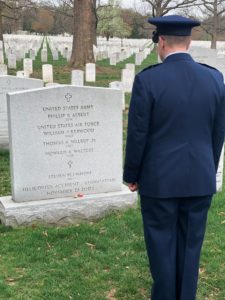
Afghanistan
If you’ve been part of AFSOC in the last 20 years, Afghanistan is almost certainly part of you. I spent the middle third of my career in and out of there between 2002 and 2011, with all the attendant highs and lows. From the very beginning to the very present, I have been responsible for sending countless Airmen into harm’s way there, not all of whom returned to their families. In November 2003, I sent home the remains of my teammates and friends in the aftermath of the first fatalities I experienced as a commander. In May of 2011, we killed Osama bin Laden. Highs and lows…lows and highs…I’ve felt it all.
Like many, I struggle to make sense of it all. There will be history books written about everything from our tactics to our strategy and a host of unanswered questions swirling around in all our minds…all of it will be dissected under the cold, unforgiving light of retrospective assessment. I think I’m still way, way too close to be able to opine on any of this with any degree of certainty. However, there are a few things of which I’m certain.
First, the Airmen of AFSOC have done what they were asked to do magnificently. Valor. Sacrifice. Duty. All of it. I wake up every morning with a profound sense of gratitude to be associated with this command and the Airmen who comprise it. Even today, AFSOC forces continue to answer the call and loyally do the things they’re asked to do in these chaotic, turbulent times. From Medal of Honor recipient MSgt John Chapman to the still-serving squadron commander currently on his 19th deployment, AFSOC Airmen have done their duty magnificently.
Second, there will be many hard days…months…years…ahead for many of us as we reflect–often with with deep ambivalence–on how we feel about our experiences in Afghanistan. We’ll process this all while continuing to deal with the physical wounds, the neurocognitive wounds, the psychological wounds, and the moral wounds we’ve suffered along the way.
If, like me, you find yourself trying to put your own experiences into some context which will allow you to move forward positively and productively, I urge you to talk about it. For our still-serving Airmen and families, you can start with chaplains, psychologists, and physicians. For our teammates who have separated or retired since 9/11, there are resources available for you as well. While there is no “one size fits all” answer, there is a size which fits. If you can’t find resources through the Preservation of the Force and Families program, the Veteran Affairs Administration, the local Chapel, the Mental Health clinic at your servicing Medical Group, the Airman and Family Readiness Center, or Military OneSource, ask your chain of command or message me directly and let us help you find the right avenue. We’ve been through too much together as an AFSOC team to try to process these very complex things on our own.
I expect I’m not alone in being reminded of the famous opening lines of “A Tale of Two Cities.”
“It was the best of times, it was the worst of times, it was the age of wisdom, it was the age of foolishness, it was the epoch of belief, it was the epoch of incredulity, it was the season of light, it was the season of darkness, it was the spring of hope, it was the winter of despair.”
I don’t know what it all means. But for now, the knowledge that doing one’s duty is its own reward will have to be enough.